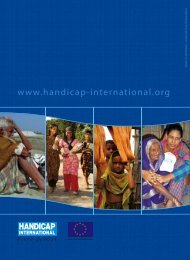Full page photo print - Harvard Law School Project on Disability
Full page photo print - Harvard Law School Project on Disability
Full page photo print - Harvard Law School Project on Disability
Create successful ePaper yourself
Turn your PDF publications into a flip-book with our unique Google optimized e-Paper software.
of cultural life. 2 The c<strong>on</strong>venti<strong>on</strong> <strong>on</strong> the Rights of the child (CRC) recognizes the right of the<br />
child to rest and leisure, to engage in play and recreati<strong>on</strong>al activities appropriate to the age of<br />
the child, and to participate freely in cultural life and the arts. 3<br />
While reflected in various human rights instruments, these rights are not as well-developed as<br />
other human rights and are often forgotten. The right of pers<strong>on</strong>s with disabilities to participate<br />
in a wide array of cultural, recreati<strong>on</strong>al, sporting, and leisure activities is recognized as central<br />
to full inclusi<strong>on</strong> for disabled people and is therefore defined in some detail in Article 30 of<br />
the CRPD. For this reas<strong>on</strong> the CRPD is an important development in human rights law <strong>on</strong><br />
participati<strong>on</strong> in culture, sport, recreati<strong>on</strong> and related activities.<br />
Article 30 of the cRPd recognizes:<br />
• The duty of States to take measures to support access to places where cultural<br />
performances or services take place. This includes, for example, theatres, museums,<br />
cinemas, libraries and tourism services. It also includes, as far as possible, access to<br />
m<strong>on</strong>uments and sites of nati<strong>on</strong>al cultural importance.<br />
• The right of people with disabilities to develop and practice their creative, artistic,<br />
and intellectual potential for both individual and societal benefit. This recognizes that<br />
people with disabilities are full participants in the cultural life of their communities as, for<br />
example, artists, musicians, scholars and actors.<br />
• The duty of States to ensure that laws protecting intellectual property rights do not<br />
present unreas<strong>on</strong>able or discriminatory barriers in access to cultural materials by<br />
pers<strong>on</strong>s with disabilities. This would cover, for example, translating books and other<br />
material into Braille, providing audio cassettes or providing sign language or forms of<br />
accessible technology for artistic performances.<br />
• The right of disabled pers<strong>on</strong>s to equal recogniti<strong>on</strong> and support of their cultural and<br />
linguistic identity. This includes, for example, the right to use sign languages and<br />
recogniti<strong>on</strong> and support of Deaf culture. The CRPD therefore recognizes that people<br />
who are part of Deaf culture use sign language as their primary language and see<br />
themselves not as disabled, but as members of a cultural or language minority.<br />
• The duty of States to promote the inclusi<strong>on</strong> of pers<strong>on</strong>s with disabilities in mainstream<br />
sporting activities. This approach favors an inclusive approach to programming, where<br />
people with disabilities have equal access to sport and recreati<strong>on</strong>al facilities (such as<br />
equal access to swimming pools and adaptive playgrounds) and have opportunities<br />
for participati<strong>on</strong> in both disability-specific sport and recreati<strong>on</strong> (such as wheelchair<br />
basketball) and mainstream sport programming.<br />
• The rights of pers<strong>on</strong>s with disabilities to organize, develop, and participate in sport and<br />
recreati<strong>on</strong> with other pers<strong>on</strong>s with disabilities, including activities organized specifically<br />
for pers<strong>on</strong>s with disabilities. This covers both mainstream as well as disability-specific<br />
sport.<br />
2 See http://www.un.org/womenwatch/daw/cedaw<br />
3 See http://www.unhchr.ch/html/menu3/b/k2crc.htm<br />
180 hUmAn RighTs. yes! AcTi<strong>on</strong> And AdvocAcy <strong>on</strong> The RighTs of PeRs<strong>on</strong>s wiTh disAbiliTies




